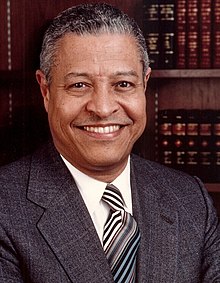Clifton R. Wharton Jr.
Clifton Reginald Wharton, Jr. (* 13. September 1926 in Boston , Massachusetts ) is an American entrepreneur , business leaders and university professors , who in 1987 as the first African American Chief Executive Officer (CEO) of a company of the Fortune Global 500 was and 1993 briefly deputy Secretary of State of the United States .
Life
Studies, professor and university president
Wharton, son of the first African-American ambassador Clifton Reginald Wharton (1899–1980) and a chemistry professor , began studying history at Harvard University at the age of 16 after attending the Boston Latin School in 1942 , where he obtained a Bachelor of Arts (BA History ). He then completed a postgraduate degree in international relations at Johns Hopkins University in 1948 with a Master of Arts (MA International Affairs). He completed another degree in economics at the University of Chicago in 1956 with an MA in Economics before he also obtained a Philosophiae Doctor (Ph.D. Economics) there in 1958 .
He then began his professional career in 1958 at the Agricultural Development Council , founded in 1953, where he initially worked until 1964, and in the early 1960s he was also a visiting professor of economics at the University of Malaya .
After a subsequent position as professor of economics at Stanford University , he was from 1966 to 1970 Vice President of the Agriculture Development Council . During this time, he was not only a member of US President Lyndon B. Johnson's 1966 Task Force on Agriculture in Vietnam , but was also a member of the Advisory Staff for East Asia and the Pacific at the United States Department of State between 1966 and 1969 . In 1969 he also took part in a trip abroad by President Johnson to Latin America . In 1971 Wharton was elected to the American Academy of Arts and Sciences .
In 1970 he accepted a professorship in economics at Michigan State University and continued teaching until 1978. At the same time he was President of Michigan State University as the successor to Walter Adams during this time . At the same time, he became a trustee of the Rockefeller Foundation in 1970 and held this position until 1987. He was also chairman of the US State Department's Department of International Food and Agriculture Development from 1976 to 1983.
After completing his work at Michigan State University, Wharton became Chancellor of the State University of New York in 1978 and held this office until 1987. In addition, he was not only a member of the US Commission on World Hunger from 1978 to 1980, but also became co-chair in 1983 the US Commission on Security and Economic Assistance. He was also Chairman of the Rockefeller Foundation's Trustees Council from 1982 to 1987.
CEO of TIAA-CREF and Deputy Foreign Minister
In 1987 Wharton became Chief Executive Officer (CEO) of Teachers Insurance and Annuity Association - College Retirement Equities Fund (TIAA-CREF), the leading U.S. pension fund for college, school, research and cultural employees. With him for the first time an African American CEO of a company listed in the Fortune Global 500.
In addition, he was a member of the US Advisory Commission on Trade Policy and Negotiations in 1991 and was temporarily a member of the Boards of Directors of Burroughs Corporation , the Equitable Life Assurance Society , the Federal Reserve Bank of New York , the Federated Department Stores , the Ford Motor Company , the New York Stock Exchange , from Tenneco , from Time Warner and Harcourt General. Wharton was also a trustee of the American Assembly, the Aspen Institute , The Asia Society , the Council on Foreign Relations and the Museum of Modern Art .
After he finished his work at TIAA-CREF in 1993, he was from January 27 to November 8, 1993 Deputy Minister of Foreign Affairs ( US Deputy Secretary of State ) in the government of President Bill Clinton .
Wharton is an Honorary Fellow of the School of International Studies at Oklahoma State University .
Publications
- Subsistence Agriculture and Economic Development (1969)
- Community and Change: Academic Greatness Under Stress (1971)
- Patterns for Lifelong Learning (1973, co-author Theodore M. Hesburgh )
Web links
- Clifton R. Wharton Jr. in the nndb (English)
- Biography (Cornell University homepage)
- Biography (The History Makers)
- Biography (Homepage of the Agricultural & Applied Economics Association)
- Biographical data and interview
Individual evidence
| personal data | |
|---|---|
| SURNAME | Wharton, Clifton R. Junior |
| ALTERNATIVE NAMES | Wharton, Clifton Reginald junior (full name) |
| BRIEF DESCRIPTION | American politician, university professor and manager |
| DATE OF BIRTH | September 13, 1926 |
| PLACE OF BIRTH | Boston , Massachusetts |

